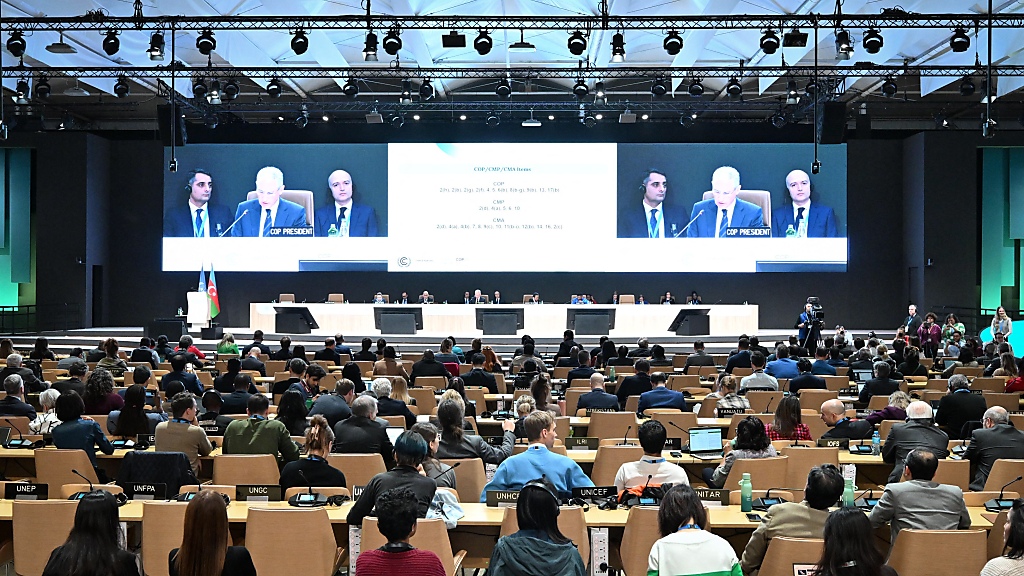The decision had previously been bitterly fought over at COP29 in Baku, and the final plenum was also interrupted several times. Representatives of particularly vulnerable countries such as small island states occasionally left the negotiations in protest. Industrialized countries pushed for the inclusion of economically strong emerging countries such as China, which only succeeded to a very limited extent. Developing countries, which formally include China, were “encouraged” to make contributions “on a voluntary basis.”
During the conference, developing countries called for contributions of $1.3 trillion annually by 2035, and an increase in industrialized countries’ contributions to $500 billion at least by 2030. The sum of 1.3 trillion dollars is now also mentioned in the resolution as a target figure, but without further information on the source of the funds. However, a process was decided on, the “Baku to Belem roadmap”, to explore options for this. The word “at least” before the $300 billion target was inserted into the text of the resolution at the last minute. The next COP will take place next year in Belem, Brazil.
“The world has missed the chance to finally open the money taps necessary to confront the climate crisis worldwide. This is a bitter disappointment for everyone whose livelihoods and homes are already being destroyed by the climate crisis,” said Jasmin Duregger, climate and energy expert at Greenpeace in Austria and on site in Baku, in an initial statement. However, there is a glimmer of hope in the agreement to develop a roadmap for increasing financial resources by the next climate summit in Brazil. Ways must be found there to make the real perpetrators of the climate crisis – the fossil fuel industry – pay.”
**How effectively does the “Baku to Belem roadmap” address the concerns raised by Mr. Rodriguez regarding the immediate threats faced by developing island nations, and what specific mechanisms within the roadmap could ensure tangible progress by COP30?**
## Interview: The Baku Climate Summit – A Missed Opportunity or a Stepping Stone?
**Guests:**
* **Dr. Maya Anderson:** Climate Economist, specializing in climate finance
* **Mr. Javier Rodriguez:** Representative from a coalition of developing island nations.
**Introduction:**
Welcome to World-Today-News.com’s exclusive interview following the contentious COP29 summit in Baku. We’re joined by Dr. Maya Anderson, a leading climate economist, and Mr. Javier Rodriguez, representing a coalition of developing island nations deeply impacted by climate change.
**Section 1: The Funding Gap**
* **Moderator:** The Baku summit saw heated debates around climate financing. Dr. Anderson, the article mentions a requested $1.3 trillion from developing countries by 2035, yet industrialized nations were reluctant to commit. What are the economic and political factors driving this resistance?
* **Moderator:** Mr. Rodriguez, from your perspective representing vulnerable nations, how critical is this funding gap to addressing the immediate threats your communities face? What are the potential consequences of inaction?
* **Moderator:** Dr. Anderson, some argue that the “voluntary contributions” encouraged from developing nations, including China, could be a solution. What are the implications of such an approach, and how sustainable is it in addressing the scale of the climate crisis?
** Section 2: The Baku to Belem Roadmap**
* **Moderator:** The summit resulted in the “Baku to Belem roadmap” to explore financing options. What are your initial thoughts on this roadmap, Dr. Anderson? Does it offer a realistic pathway for securing the necessary funds?
* **Moderator:** Mr. Rodriguez, what are your expectations from this roadmap? What specific mechanisms or solutions should be prioritized to ensure tangible outcomes for vulnerable nations by the next COP in Brazil?
** Section 3: Responsibility and Accountability**
* **Moderator:** The article quotes Greenpeace calling out the “real perpetrators of the climate crisis – the fossil fuel industry.” Dr. Anderson, how should the responsibility for funding climate action be shared? Should fossil fuel companies play a more direct role?
* **Moderator:** Mr. Rodriguez, how can developing nations advocate for greater accountability from industrialized nations and the fossil fuel industry, especially considering the historical contributions to emissions?
**Section 4: Looking Ahead**
* **Moderator:** Despite the challenges, are there any positive takeaways from COP29? What signs of progress or cooperation offer hope for future climate negotiations?
* **Moderator:** Looking towards COP30 in Brazil, what are your key expectations and hopes Dr. Anderson and Mr. Rodriguez? What needs to happen to ensure a more just and effective global response to the climate crisis?
**Conclusion:**
Thank you to Dr. Anderson and Mr. Rodriguez for their insightful perspectives. The road to addressing climate change is undoubtedly complex and fraught with challenges. But as we’ve discussed today, there is a growing urgency to find solutions that are both equitable and effective. The outcome of COP30 will be crucial in determining the future trajectory of global climate action. We at World-Today-News.com will continue to closely monitor these developments and provide our readers with informed and in-depth analysis.

